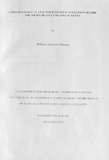| dc.description.abstract | Climate change has been termed as the biggest management challenge of the century, maybe the millennium (Liedtke 2008). Warming of the climate system is unequivocal, with effects such as increasing land and ocean temperature and rising global average sea level among others OPCC, 2007a). These changes are linked directly to human activities producing greenhouse gases (GHG) and are already causing changes in ecosystems, water supply and availability, and patterns of extreme events, with consecutive damages to human health, livelihoods, and infrastructure.
The Kyoto protocol as well as other current and future international and national environmental agreements enacted for purposes of addressing climate change issues, interact with business and trade, and in particular affect non-discriminatory rules relating to trade in goods, trade in services, trade related aspects of intellectual property rights, subsidies and countervailing measures, trade related investment measures and technical, barriers to trade (Hoffman, 2006).
The challenges of managerial policy development and implementation regarding climate change in companies and multinational corporations, is compounded with the complexity of future regulatory compliance, physical and competitive challenges which require specialized knowledge and skills relating to climate change mitigation and adaptation, Microfinance industry involves lending small amounts of money to the world's poor for productive activities. It has become a popular strategy for poverty-alleviation in many countries. In Kenya,. the industry has grown with tremendous success achieving legislative status as a development strategy.
Microfinance in Kenya have a task of serving the poor in the midst of the challenges of climate change. The industry ip thus faced with a dilemma of development impact arising from climate change or administrative efficiency to serve the poor. Climate change is creating covariate risk and opportunities not previous experienced by MFls.Thus MFI needs to reconfigure their approaches in all business areas to deal with its consequences. Lack of familiarity with potential products and slow adoption of known ones may limit the development of strategies for MFls. There is need to integrate climate change adaptation and mitigation into business operations of MFls.
This study has assessed the awareness' of MFI operators of the importance of climate change mitigation and adaptation in the business operations of the microfinance industry in Kenya. It has also determined some actions ill form of products, processes and services that MFI are taking 'to address climate change issues in the industry.
KEYWORDS
Climatechange, ligation, adaptation, micro-finance, risk, opportunity | en_US |

